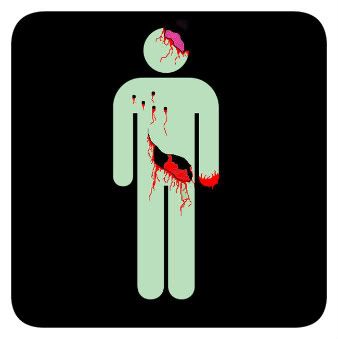
Seriously, what's with all the sudden interest from actual scientists? Do they know something we don't? From Wired:
Mathematical Model for Surviving a Zombie Attack
By Betsy Mason
August 14, 2009
It is possible to successfully fend off a zombie attack, according to Canadian mathematicians. The key is to “hit hard and hit often.”
Oh yes, somebody actually did a study on mathematics of a hypothetical zombie attack, and published it in a book on infectious disease. So, while we still don’t know what to do if a deadly asteroid takes aim at Earth, an unlikely but technically possible situation, we now know what to do in case of a zombie attack.
“An outbreak of zombies is likely to be disastrous, unless extremely aggressive tactics are employed against the undead,” the authors wrote. “It is imperative that zombies are dealt with quickly, or else we are all in a great deal of trouble.”
Having spent a fair amount of time mixing science with beer in the wee hours while trying to finish a thesis, I’m guessing that at some point, a graduate student who had spent far too many hours tweaking a mathematical model of infectious disease in the basement of a Canadian university said something like this: “What would happen if we made it so they could come back to life?”
This was followed by the other math students in the basement gathering around the computer, happily creating a plausible model for the outbreak of infectious zombie disease, and then brainstorming on how to make their model relevant.
“Clearly, this is an unlikely scenario if taken literally,” they wrote. “But possible real-life applications may include allegiance to political parties, or diseases with a dormant infection.”
Right.
Anyway, the model focuses on modern zombies, which are “very different from the voodoo and the folklore zombies.” It takes into account the possibility of quarantine (could lead to eradication, but unlikely to happen) and treatment (some humans survive, but they still must coexist with zombies), but shows that there is only one strategy likely to succeed: “impulsive eradication.”
“Only sufficiently frequent attacks, with increasing force, will result in eradication, assuming the available resources can be mustered in time,” they concluded.
And if we don’t act fast enough?
“If the timescale of the outbreak increases, then the result is the doomsday scenario: an outbreak of zombies will result in the collapse of civilization, with every human infected, or dead,” they wrote. “This is because human births and deaths will provide the undead with a limitless supply of new bodies to infect, resurrect and convert.”How fast do we need to deal with the outbreak? Here’s the equation they used, where S = susceptibles, Z = zombies and R = removed. If an infection breaks out in a city of 500,000 people, the zombies will outnumber the susceptibles in about three days.
Maybe being a mathematician wouldn’t be so bad, after all.
Citation: “When Zombies Attack!: Mathematical Modelling of an Outbreak of Zombie Infection,” [pdf] by Philip Munz, Ioan Hudea, Joe Imad and Robert J, Smith. In “Infectious Disease Modelling Research Progress,” eds. J.M. Tchuenche and C. Chiyaka, Nova Science Publishers, Inc. pp. 133-150, 2009.


0 comments:
Post a Comment